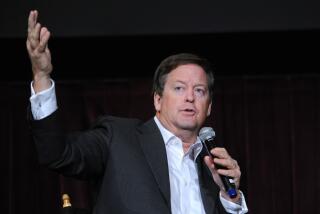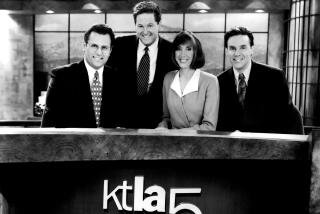KORLA PANDIT SPEAKS! : FAMILIAR FACES HONOR KTLA FOUNDER
- Share via
Roberta Linn was there, recalling how, after timidly waiting through a long evening of auditions, her mother finally pushed her into singing for Lawrence Welk. She was hired on the spot and a few days later became his first TV “Champagne Lady”--on Channel 5.
Stan Freberg and Daws Butler were there, remembering how they had auditioned “Time for Beany” for the three networks in Bob Clampett’s garage, with no takers. But one Friday afternoon, the head of a local station came to see them, and the following Monday, they were on the air--on Channel 5, where they played 52 weeks a year for five years.
For the record:
12:00 a.m. May 22, 1985 FOR THE RECORD
Los Angeles Times Wednesday May 22, 1985 Home Edition Calendar Part 6 Page 11 Column 3 Television Desk 1 inches; 19 words Type of Material: Correction
The name of band leader Leighton Nobel was misspelled in last Wednesday’s Calendar story about “Klaus Landsberg Day” in Los Angeles.
Former State Atty. Gen. Evelle J. Younger told of being the legal expert/star of “Armchair Detective,” an early audience participation/mystery show--on Channel 5.
And Korla Pandit, the turbaned organist who never spoke a word during his 900 TV shows, did speak, praising all the talented, creative people from the early days of television--on Channel 5.
A good number of those people--familiar TV faces from the ‘50s, along with the technical wizards who worked behind the scenes--had gathered together Monday night to share their memories and pay tribute to Klaus Landsberg, the man who put KTLA Channel 5 on the air in January, 1947, the first commercial TV station in the West.
Mayor Tom Bradley had proclaimed Monday as “Klaus Landsberg Day” in Los Angeles. At midday, a star honoring Landsberg was unveiled in the Hollywood Walk of Fame, and the day was capped by a KTLA reunion at Sportsmen’s Lodge. Concurrently, KTLA’s history is being spotlighted at the Museum of Broadcasting’s Television Festival, under way at Universal Studios.
Landsberg died of cancer in 1956. He was 40 and his station had been on the air less than a decade, but in that period he had been both a pioneer and innovator, hand building the first transmitter atop Mt. Wilson, covering live the first atomic test in Nevada in 1952, carrying 27 1/2 hours of live coverage of the Kathy Fiscus-well disaster in San Marino in 1949, producing and directing some 3,500 shows.
“Genius” was the word most often used as associates remembered Landsberg Monday night. And many called him “demanding” and “tough.”
“He’d always tell you, ‘You can do it, fella’,” said Bud Stefan, who worked as a writer/producer/director/star on such early Channel 5 shows as “Sandy Dreams” and “Yer Ole Buddy.”
“Genius,” said Pat Buttram, “is a word we use now for a guy when we can’t figure out how he made it.” That didn’t apply to the hard-working Landsberg, he added.
Cliffie Stone remembered when his music show on Channel 13 was nibbling away at the opposing Spade Cooley show on Channel 5. “Klaus called and said he’d double what I was making if I’d come over to Channel 5 to precede the Cooley show,” Stone said. “It sounded like a good deal, so I did . . . and my rating went up 20 points.
“What I wonder, though, is who’s going to do for the young people in the future what Klaus did for us? Today, you either work at the Palomino Club or you’re on NBC. There’s nothing in between.”
Bandleader Leighton Nobel (“Bandstand Revue”) had come from Victoria, Canada, to attend. Jim Hawthorne, the innovative radio and TV comic, had come from Denver. Dorothy Gardiner, Scatman Crothers, the McDonald Sisters, Ironeyes Cody, Doye O’Dell, Johnny Grant, Ken Graue, Stan Chambers and Tom Hatten also were there.
“Klaus was a visionary,” said Dick Sinclair, who hosted “Polka Parade” for 15 years. “In those days, the network stations were only showing kinescopes, but Klaus was putting on live shows.
“Now, it’s a bean contest, a numbers game. You can’t take chances anymore,” Sinclair said.
Jim Hawthorne echoed that. “That was the thing about the ‘early’ days. You could try anything, and it was an era when young people were given a chance.”
Landsberg’s eldest son, Cleve, said the evening was not only in honor of his father but a salute to all the Channel 5 pioneers. “Something had to be done to get the proper recognition not just for Dad but all the people here,” he commented. “This is the group that set the rules for what’s done today.”
More to Read
The biggest entertainment stories
Get our big stories about Hollywood, film, television, music, arts, culture and more right in your inbox as soon as they publish.
You may occasionally receive promotional content from the Los Angeles Times.










